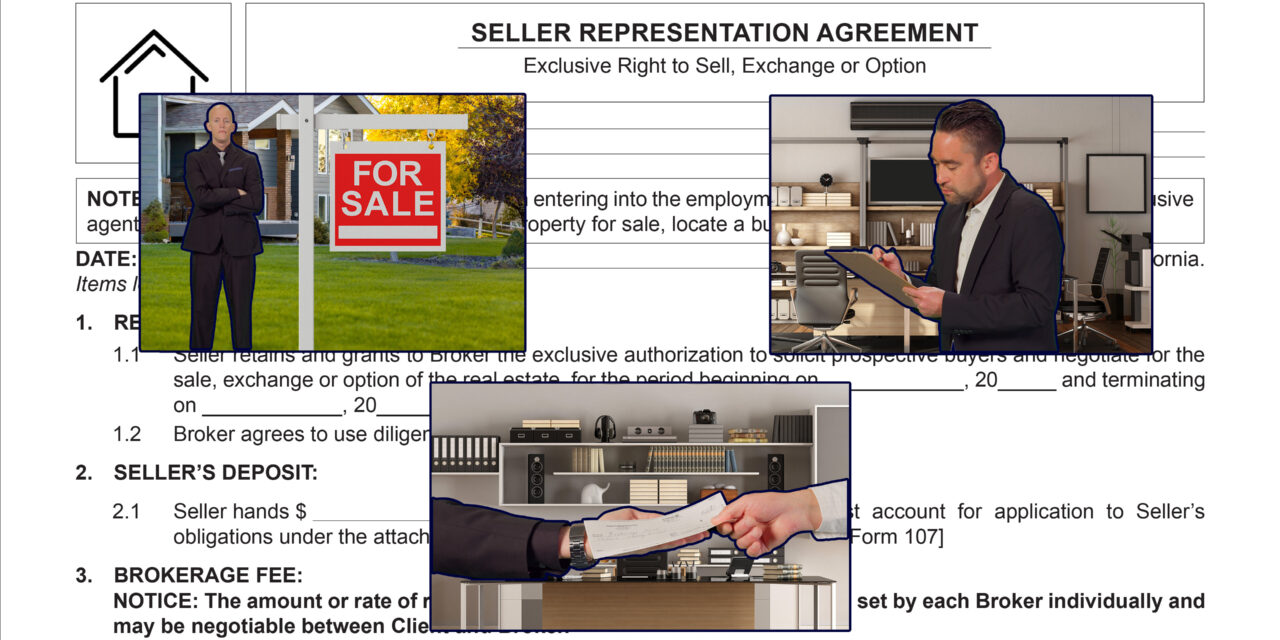What this video contributes to the discussion: See the operative provisions of the seller representation agreement, and watch how they function.
The prior episode in this series covers the various real estate brokerage services performed in anticipation of earning a fee.
A peek under the hood at the form mechanics
Each section in an exclusive seller representation agreement has a separate purpose and need for enforcement. [See RPI Form 102 and 102-1]
The sections include:
- Retainer period: This sets the period of employment for providing brokerage services, established by a start and end date for the representation. Next is the statement the seller broker will use diligence in the performance of this representation. This same duty also applies to the broker’s agents. [See RPI Form 102 §1]
- Seller’s deposit: Advance marketing costs needed to best perform the brokerage services are entered in an itemized list of services. A Marketing Package Cost Sheet is attached to detail the services to be rendered and the costs to be incurred and charged against the deposit. [See RPI Form 102 §2; see RPI Form 107]
- Brokerage fee: This section begins with a mandated boilerplate notice stating real estate fees are set by negotiations with the client and not fixed by law. Below this, the form contains conditions when the broker earns a fee the seller-client is obligated to pay and the amount of the fee set by negotiations. [See RPI Form 102 §3]
- General provisions: The seller acknowledges their receipt of a copy of the Agency Law Disclosure. Further, the broker and their agent are authorized to act on behalf of the seller-client. Such acts include posting a For Sale sign on the property, preparing and receiving a buyer’s offer and accepting a good-faith deposit. [See RPI Form 102 §4; see RPI Form 305]
- Real estate and personal property for sale: This series of provisions identifies the real estate for sale and any personal property included, and the terms of existing mortgages which encumber the property.Below this, a checklist is presented of addenda to be prepared or reviewed by the seller for inclusion in the broker’s marketing package offering the property for sale. The addenda will contain the seller’s representations about the property needed by the broker to properly market the property to locate and induce prospective buyers to purchase the property. [See RPI Form 102 §5-7]
The seller is to promptly prepare their disclosure form and authorize the broker to order out inspections, reports or clearances needed for the broker to properly market the property. All these items are included in the marketing package to inform prospective buyers of conditions on or about the property before the seller enters into an agreement to sell the property.
- Sales terms: Here, the asking price and terms for payment of the price sought by the seller-client for the sale, exchange, option or lease of the property are entered.Below is a series of checkboxes covering sale and closing costs the seller will incur to properly market and close a transaction on the property. [See RPI Form 102 §8-11]
- Signatures and identification of the participants: When prepared, the seller-client and the seller broker or their agent sign the agreement to consent to the employment.
Editor’s note — Click here for full form instructions.
Related article:
Inking the handshake
An oral agreement to represent a client in a real estate transaction creates an employment and an agency relationship, as does a written and signed representation with the client. The client may be an owner, buyer or tenant. Both a writing and oral employment — authorizing representation — imposes on the broker fiduciary agency duties owed the client.
However, a client’s oral promise to pay their broker a fee when earned does not entitle the broker to enforce collection of the fee from their client. Agreements with a client for payment of a broker fee need to be in a writing of some sort and signed by the client before the broker may enforce collection of a fee they have earned. [Calif. Civil Code §1624(a)(4)]
The signed writing contains the client’s promise to either pay a fee or cause someone else to pay the agreed fee to the broker when earned. For example, a buyer on entering into an exclusive buyer representation agreement either pays a fee when earned by their buyer broker or arranges in a purchase agreement offer for the seller to pay the fee — the latter being the norm as in the past. [See RPI Form 103.1]
Representation and fee earned under California law
Consider a California-licensed real estate broker entering into an exclusive seller representation agreement with a California resident in California. However, the property for sale is located outside of California.
The broker locates a buyer through an advertisement published in the out-of-state location, whether with or without involvement of a locally licensed broker. A purchase agreement is prepared in California, mailed to and signed by the buyer, and returned to the broker. The broker submits it to the seller in California, which the seller accepts. The buyer is notified of the acceptance.
All aspects of the transaction are handled from the broker’s California office. The purchase agreement includes a broker fee provision stating the seller broker fee is earned on entering into a purchase agreement, payable on closing.
Later, the seller cancels the transaction without excuse or justification. The California broker makes a demand on the seller-client to pay the fee the broker earned under the seller representation agreement and the purchase agreement. The seller claims the broker is barred from collecting a fee since the broker is not licensed in the state where the property is located.
May the California-licensed broker collect a fee under California law without also holding a real estate license in the state where the property is located?
Yes! The seller signed the exclusive seller representation agreement in California and the broker performed all significant licensed brokerage services in California. Here, the seller is obligated to pay the fee as called for in the seller representation agreement and set out in the purchase agreement. [Consul LTD. v. Solide Enterprises, Inc. (9th Cir. 1986) 802 F2d 1143]
Editor’s note – Brokers involved in negotiating interstate real estate transactions need to confirm a choice-of-law provision is included in their representation and purchase agreements. A California choice-of-law provision mandates decisions in broker fee disputes be based on California law, even when litigated in federal or out-of-state courts. [See RPI Form 102 §4.8]














